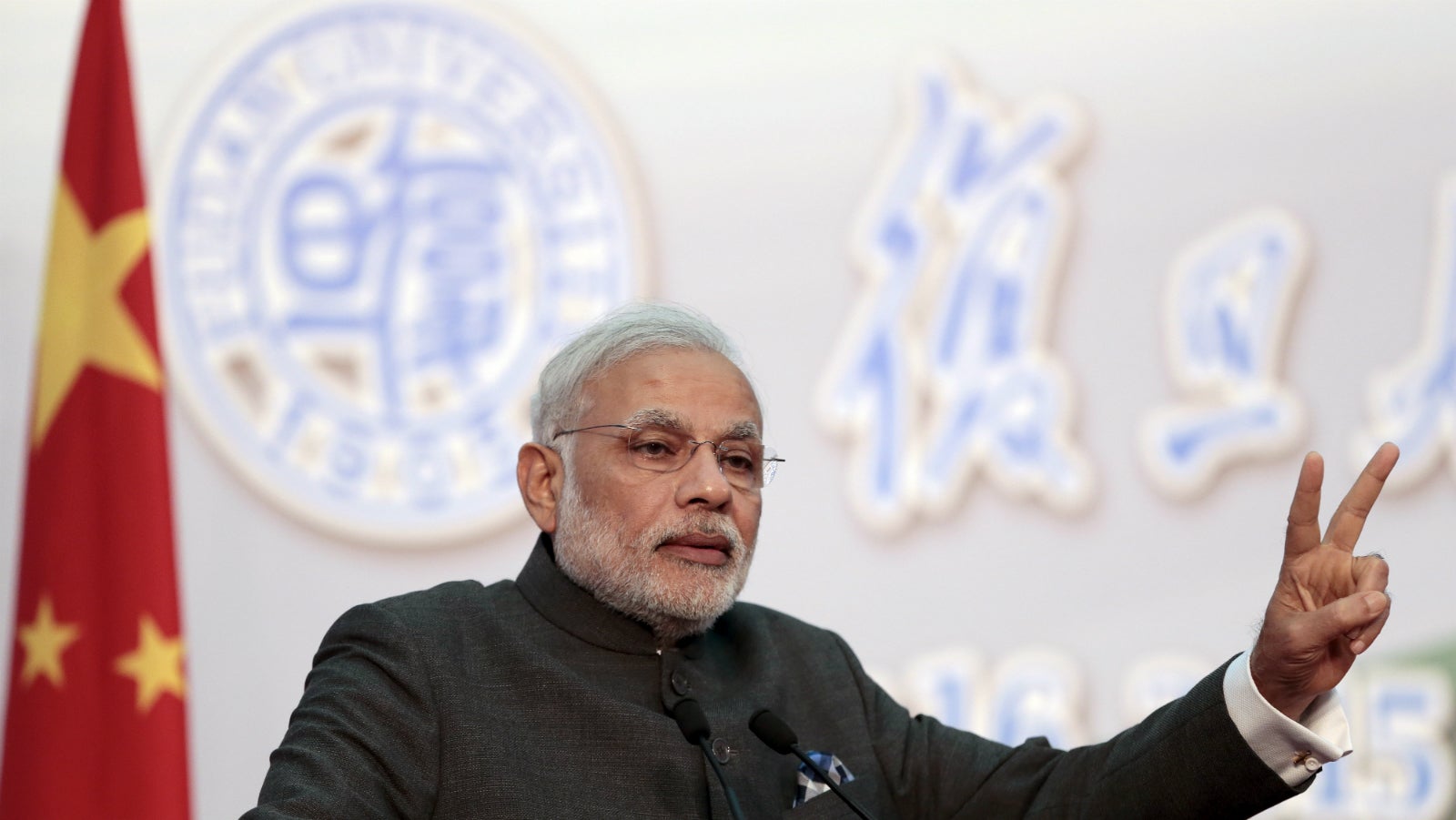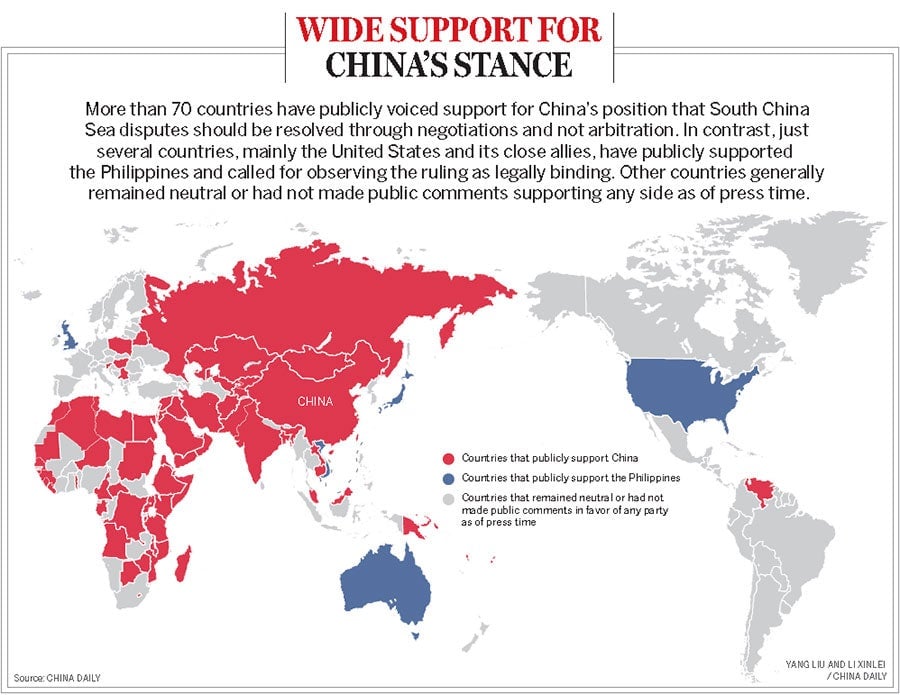China’s state media is wrong to claim India supports Beijing in the South China Sea
China is in a state of denial about India’s stand on the disputed South China Sea.


China is in a state of denial about India’s stand on the disputed South China Sea.
Two days after the Permanent Court of Arbitration in the Hague ruled that China had no historic rights over the South China Sea, the Chinese press has rolled out a list of 70 countries that have “publicly voiced” their backing for Beijing—and that includes India.
Except that India hasn’t issued any such declaration of support so far. In fact, India’s government sort of said the opposite.
“India believes that states should resolve disputes through peaceful means without threat or use of force and exercise self-restraint in the conduct of activities that could complicate or escalate disputes affecting peace and stability,” a spokesperson for India’s foreign ministry said on July 12.
Nonetheless, China Daily, a major state-run English-language newspaper, reported on July 13 that India is among the countries which believe that the “disputes should be resolved through negotiations and not arbitration.”

On July 12, the Permanent Court of Arbitration said that China’s claims to vast swathes of territory in the South China Sea did not have any historical or legal basis. China is currently building man made islands in the South China Sea, which prompted the Philippines to raise the issue at the international court.
The court also said that China’s claims were a violation of the United Nations Convention on the Law of the Sea (UNCLOS). The UNCLOS is an international agreement signed by more than 180 countries, including China, and specifies the rights of states over the oceans. Nonetheless, Beijing called the international court’s ruling “ill-founded” and “naturally null and void.”
Here, too, India doesn’t back China, based on what India said on July 12.
“As a state party to the UNCLOS, India urges all parties to show utmost respect for the UNCLOS, which establishes the international legal order of the seas and oceans,” India’s external affairs ministry said.
Why the confusion
China’s belief that India may be supportive may have to do with a trilateral agreement signed earlier this year. On April 18, the foreign ministers of China, Russia and India released a joint communique after they met in Moscow.
The South China Sea disputes are mentioned in the communique as follows:
Russia, India and China are committed to maintaining a legal order for the seas and oceans based on the principles of international law, as reflected notably in the UN Convention on the Law of Sea (UNCLOS). All related disputes should be addressed through negotiations and agreements between the parties concerned. In this regard the Ministers called for full respect of all provisions of UNCLOS, as well as the Declaration on the Conduct of Parties in the South China Sea (DOC) and the Guidelines for the implementation of the DOC.
Since then, China’s state media has ranked India as one of the many countries that back Beijing’s South China Sea stance.
“Who would have imagined that the country that supports ‘China’s South China Sea stance’ so much turns out to be India, which is ‘obsessed’ with competing with and confronting China?” a commentary (link in Chinese) on China’s nationalistic state tabloid Global Times said on April 20.
“There is great flexibility in India’s foreign policy,” the tabloid said. “It gains benefits from both the sides in the major power relations between China, the US, Russia, Japan and others.”
Minimising impact
Given the state of diplomatic ties between India and China over the past few months, it is unlikely that New Delhi would openly support Beijing on the South China Sea issue. Last month, despite intensive lobbying by India, China had stonewalled the country’s entry into the elite Nuclear Suppliers Group.
During a state visit to India last year, US president Barack Obama raised concerns over “rising tensions over maritime territorial disputes” in the South China Sea with prime minister Narendra Modi. The two countries are also reportedly planning to conduct joint naval patrols in the Indian Ocean and in the South China Sea by the end of the year.
“There’s no reason whatsoever to assume that India would oppose the Hague decision, and any Chinese protestations to the contrary are wildly off the mark,” said Michael Kugelman, a senior program associate for south and southeast Asia at the Woodrow Wilson Centre in Washington.
“It’s almost like Beijing, in its haste after the Hague judgment, tried to minimise the impact of the Hague decision by overstating levels of alleged support for China’s position—only to walk this position back once it became clear that it was looking silly by doing so,” Kugelman added.
Only eight countries have publicly voiced their support for China to boycott the arbitration, a Wall Street Journal article found in June. These are Afghanistan, Gambia, Kenya, Niger, Sudan, Togo, Vanuatu and Lesotho, according to public statements reviewed by the Journal. At that time, without publishing an official list, China claimed the backing of some 60 countries.
“I think there are about 10 countries openly supporting China, on the matter,” Darshana Baruah, a research analyst at the Carnegie Endowment for International Peace, said. ”China on the other hand has listed many more nations in its support. India has not issued any statement choosing a side, which has been its position right from the beginning.”